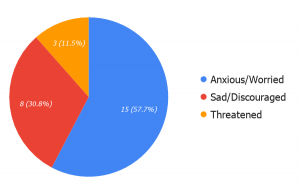Hey everyone! 🙂
In addition to popular media, many politicians from the USA and Europe also fuel anti-immigrant sentiments, referring to climate migration as dangerous and invasive. Boris Johnson, UK’s Prime Minister, even referred to the journey taken by Syrian refugees as “criminal” and “stupid”.
With the UK’s strict migrant policies already forcing more migrants to take more dangerous routes, this can only suggest greater difficulty for future climate migrants. Personally, the spread of these sentiments is more alarming and worrying than the actual migration set to happen.
Curious to grasp the real effects of the media on public attitudes regarding climate migration, I conducted a short survey. The 26 respondents were all students from the age of 18 to 21, and more than half were BES students.
Before being presented with an extract from the Guardian article mentioned last week, the following question was asked: how do you feel about the potential of increased climate migration? The following pie chart shows the responses.
After being presented with the extract which included the title, lead, and first half of the article, respondents were asked the same question, with the following results:
As seen, the article was effective in raising awareness of the issue, as those who were unaware chose a different answer when asked the second time. However, none felt neutral anymore, and more respondents felt anxious/worried, sad/discouraged, and threatened.
The change from neutral to negative feelings towards the issue strongly suggests that these articles are effective in evoking negative emotions, which may not be detrimental if it inspires more action to protect these migrants or the environment. The increase in the number of people feeling threatened, however, suggests that these articles by popular media may increase anti-immigrant sentiments.
When asked which parts of the extract elicited their change in reactions (before and after reading the extract), the 1.2 bn figure and the parts about increased conflict, civil unrest, and riots, were mentioned most. Interestingly, this is the information presented in the title and lead of the article. With one respondent mentioning that the large amount of potential migrants was “mind-blowing”, these results show that the article was able to elicit emotional reactions by using shocking figures and the idea of threats to peace.
The fact that possible civil unrest was especially impactful for respondents, however, shows the danger of these articles – they propagate perceptions that climate refugees will destroy the peace in destination countries.
These results suggest that the media, although effective in raising awareness of climate issues, may be ineffective in encouraging action to solve them. They often distract governments and the public from solving the climate crisis, as more resources may be allocated to increase migrant restrictions instead.
When asked how important/essential the media is to raising awareness of climate change and increasing global climate action on a scale of 1 to 5, most agreed that the media plays a crucial role.
When asked how EFFECTIVE the media is, however, many respondents felt it was less effective compared to its crucial role.
Personally, I agree with these results. The media is crucial, but I reckon it has a long way to go before it effectively acts as a medium for increasing climate action, because of the way it presents (occasionally untrue) information, that sometimes worsen disadvantages felt by groups threatened by climate change.
– Hope 🙂




Hi Hope
This post enlightened me as to how media has such profound impacts on our judgement of climate-related issues. However, you mentioned in your opinion piece that ‘They (media) often distract governments and the public from solving the climate crisis, as more resources may be allocated to increase migrant restrictions instead.’
This sounds to me that the media and government are dichotomous and serve different objectives. However, I do know that certain governments exact control over the media and in some countries, state news or state-controlled media. Do you think government-funded media are any different from independent ones, in terms of propagating or presenting climate issues?
Hi Wen Han! 🙂
Hm, this is interesting, thank you for your comment! Yes, although I cannot say so for sure, I do think that state-controlled media will most likely present information to further the agendas of these countries, but as Jian Xi mentioned in his comment in my previous post, independent media may also present information inaccurately for the purpose of attracting greater readership. If you’d like to find out more, here are some links!
1. https://www.ukessays.com/essays/media/government-influence-media-8363.php (it says that it’s written by a university student, but it does present some interesting views, so you may want to check it out!)
2. https://courses.lumenlearning.com/americangovernment/chapter/the-impact-of-the-media/ (bias, framing of info, etc.)
3. https://www.bbc.com/news/technology-47135058 (more on Social Media instead)
– Hope 🙂